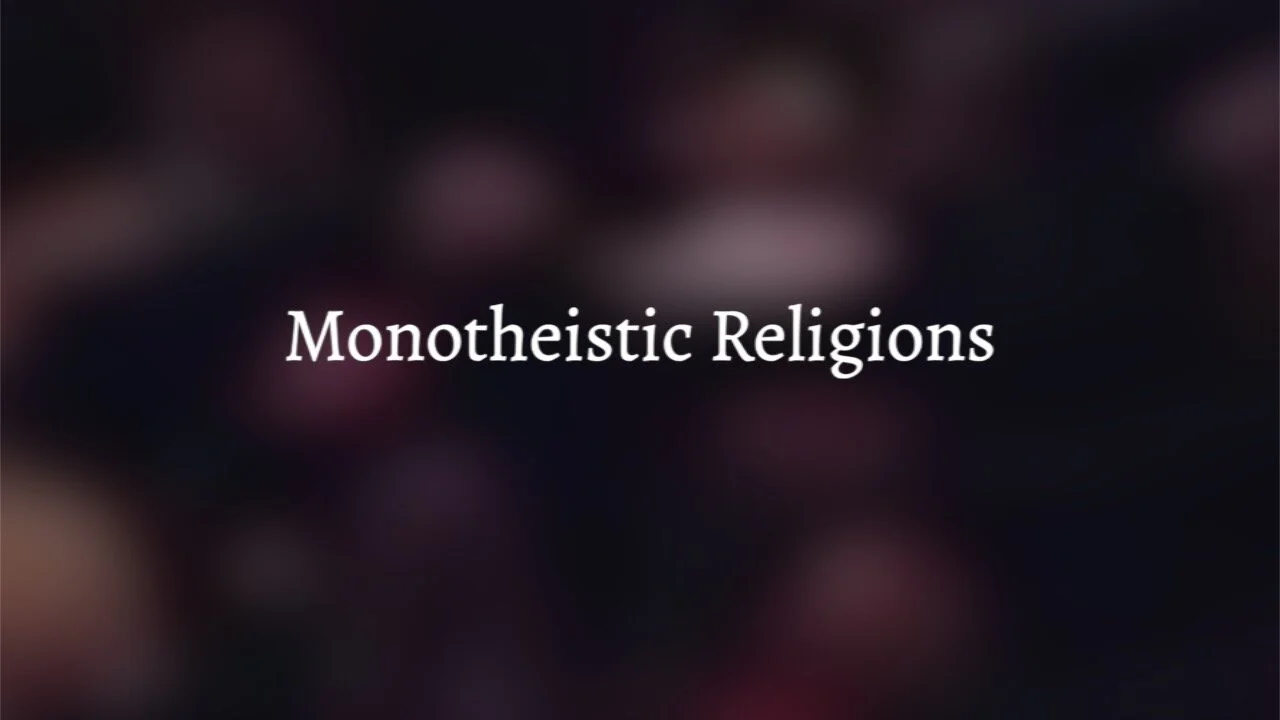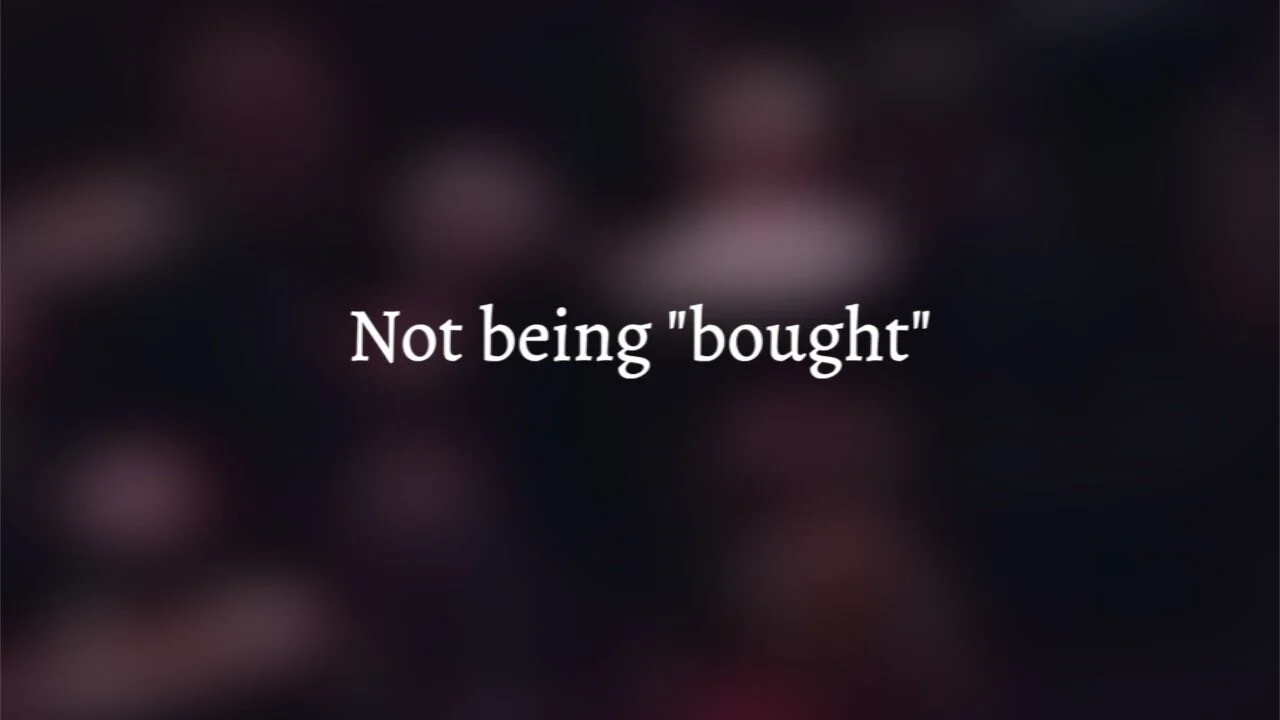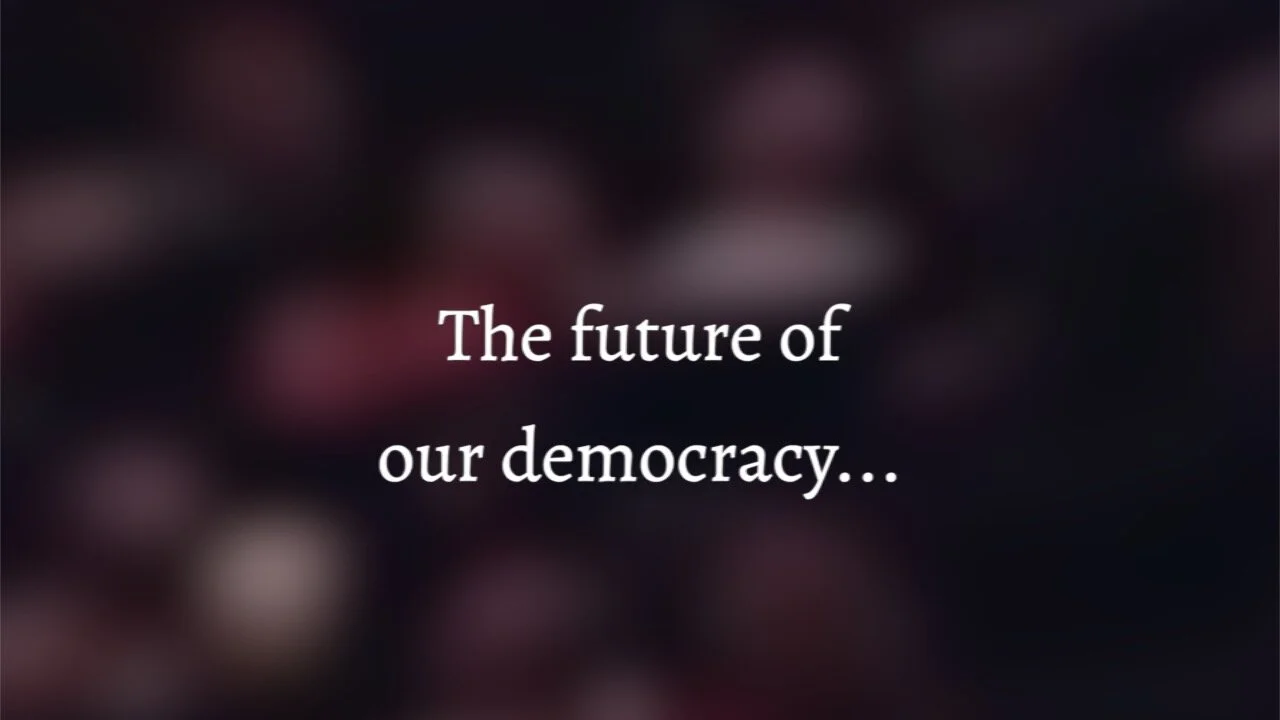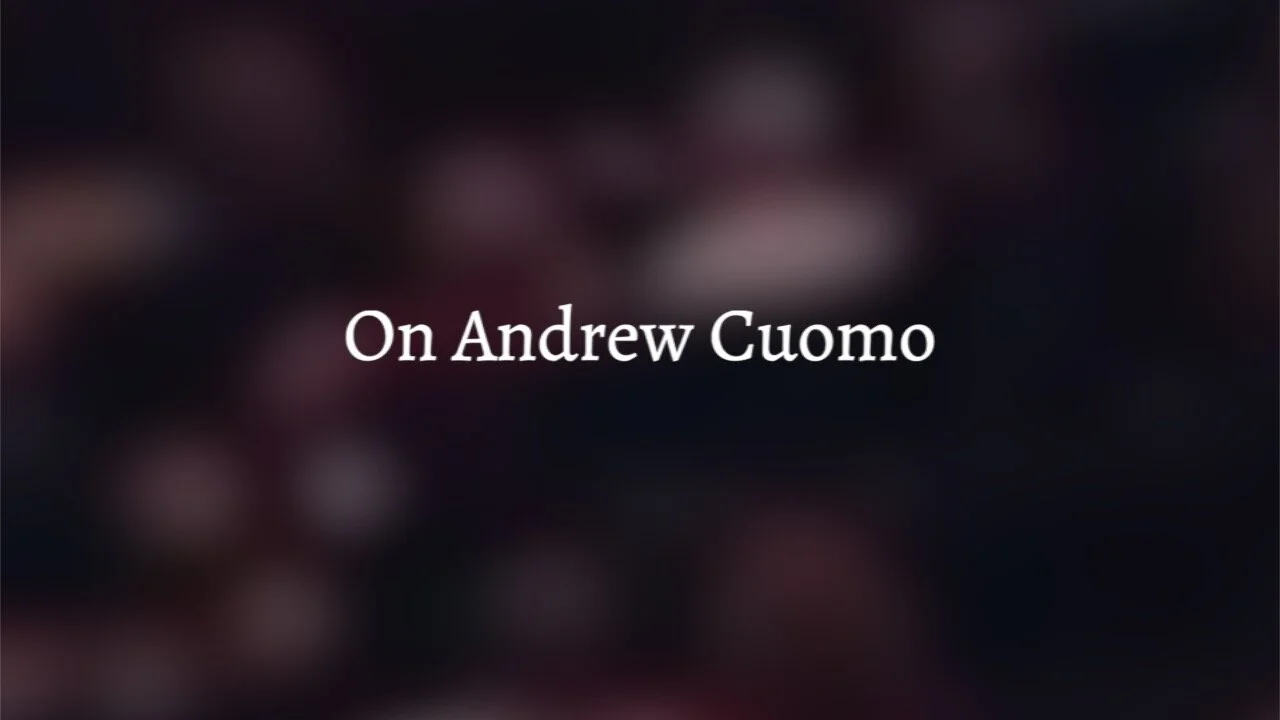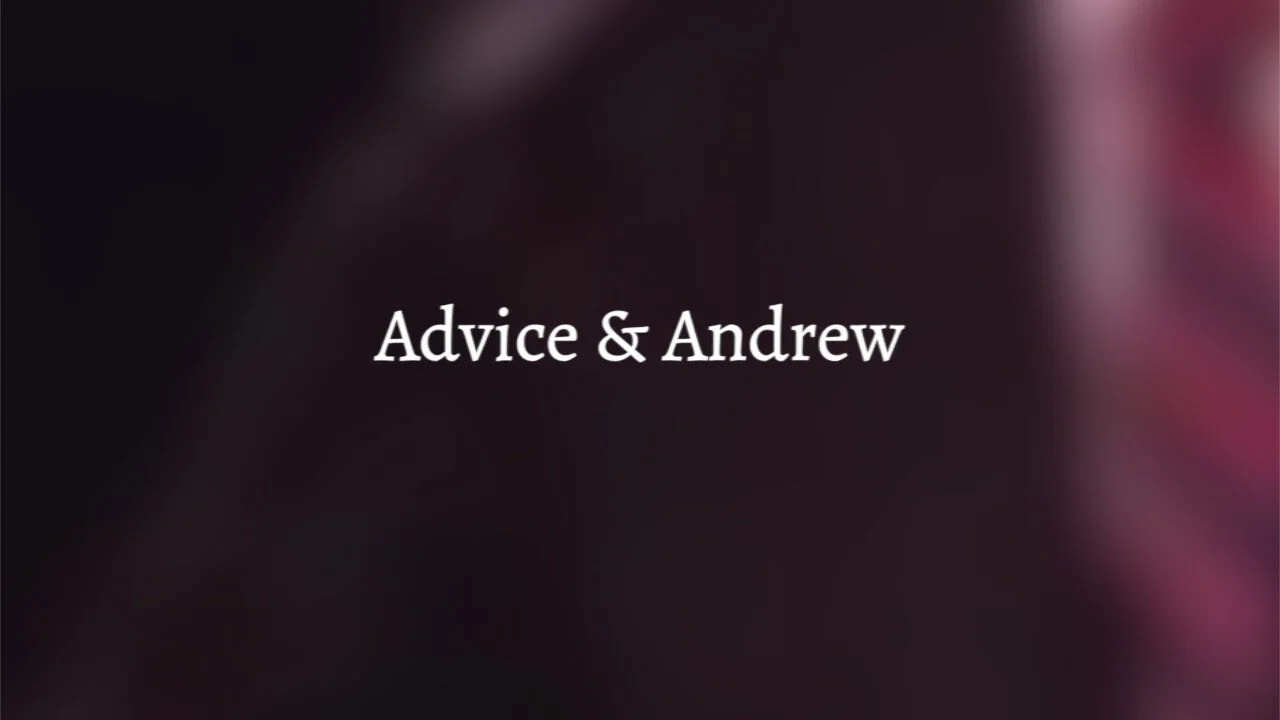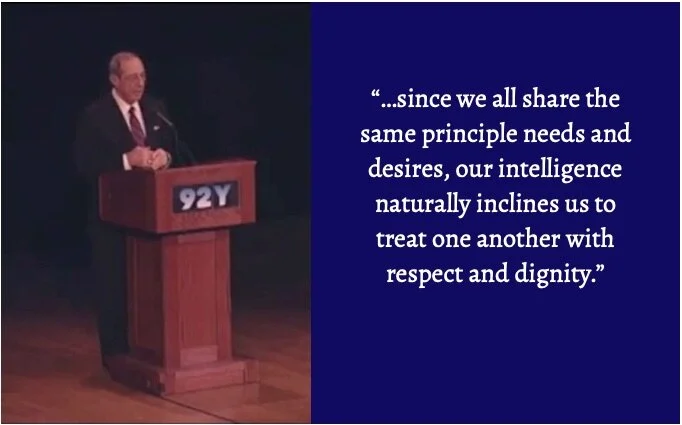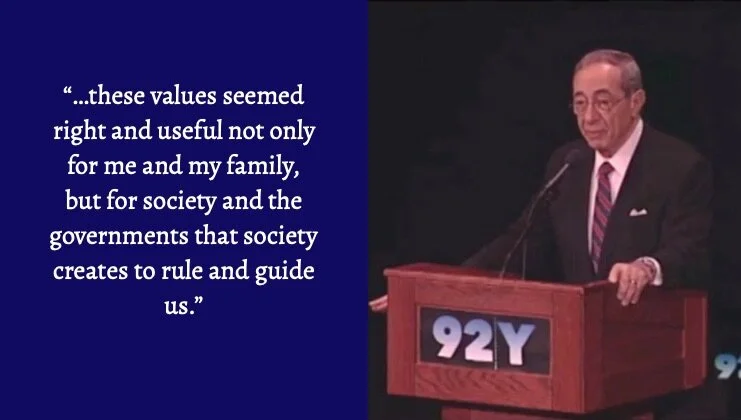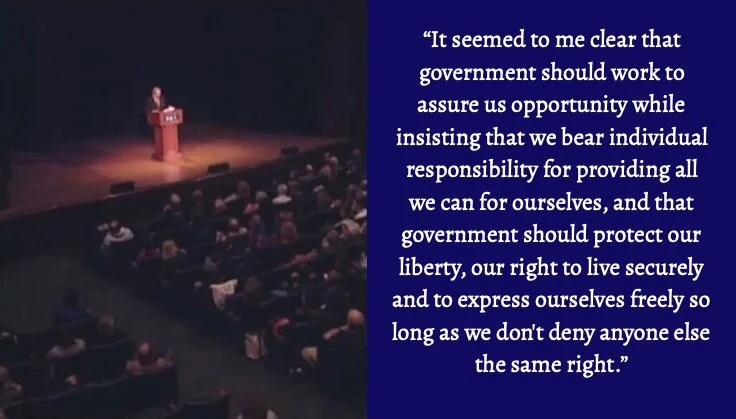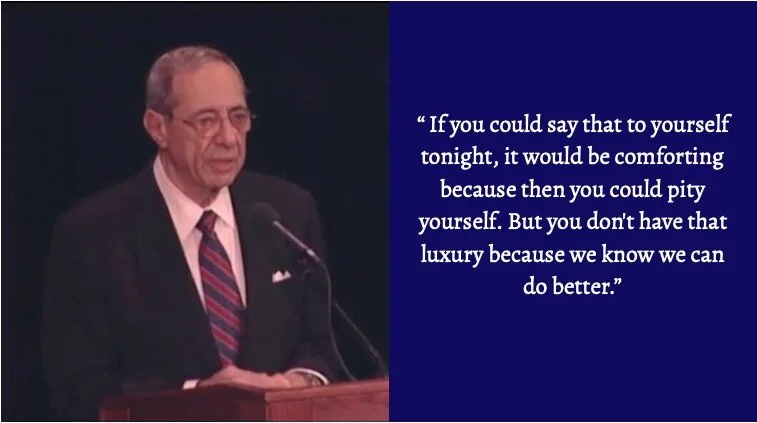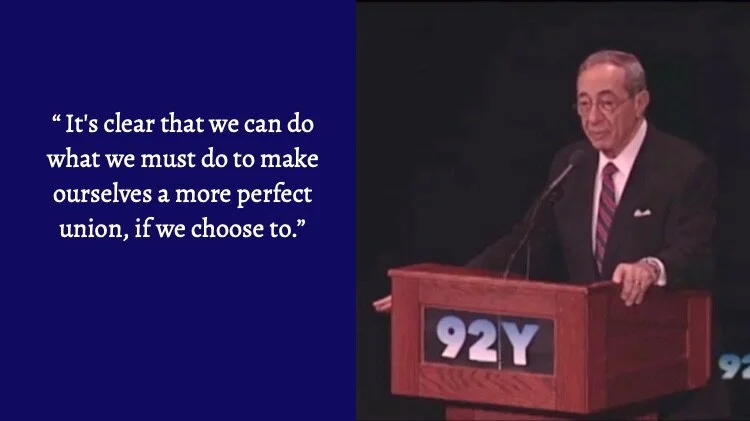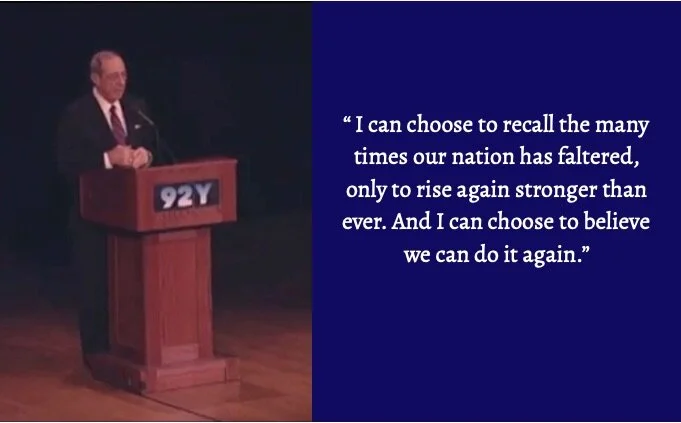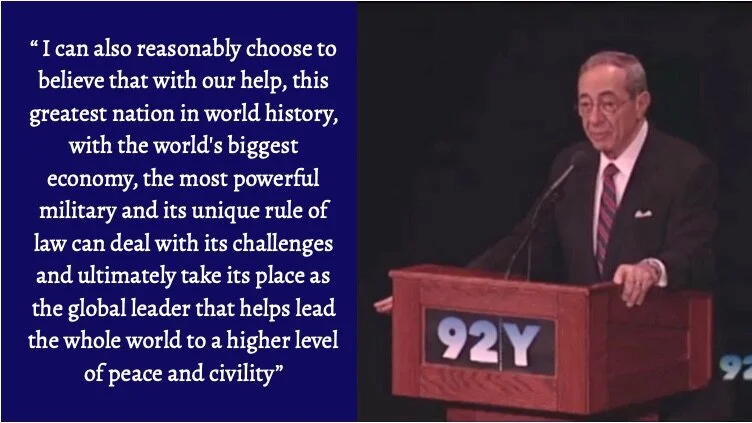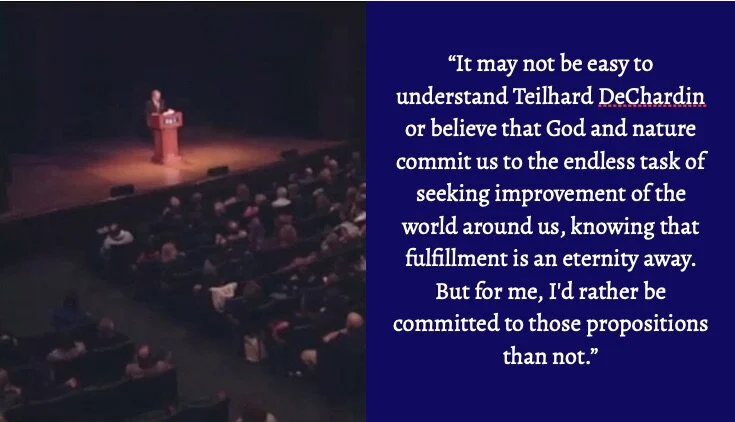92Y: Lecture of My Life
It's clear that we can do what we have to do. And if we do not do it, we risk further dividing our nation into the lucky and the left out, a nation that is squandering its opportunity to lead our people and the rest of the world to a better life.
-Governor Mario M. Cuomo
Click for Transcript
Thank you. Thank you very much. When Susan suggested that I share with you what I've learned about life in politics that I believe is most relevant, I told her I wasn't convinced I could add significantly to the predictable intelligence of a 92nd Street Y audience. And she took care of that because I think she agreed. She handled it by saying, look, I'm going to reserve a block of time at the end of the evening for the audience to participate. And the longer that period is made, the better. And that will assure us of some intelligent input before you do. And so that's all I agreed to talk about, some of the things that I've learned over the years in my own search for truth and efficacy in life. And I'll try my best to do it as swiftly as possible so that we have the maximum amount of time to deal in the Q and A's, because this is a time where I'm sure we all have a lot of questions and we're all eager to find answers. I suspect a lot of what I say will be familiar to a lot of you regulars at least. I want to make clear that I offer these thoughts not as a seer or a scholar or a philosopher or even as a politician, but as an ordinary New Yorker from South Jamaica, Queens, raised on asphalt streets with brick stoops and stickball games, who was lucky enough to become a lawyer, make a living, marry a wonderful woman, Matilda, who's with me here today, who has, who has always been much more than I deserve, help raise a family and then find my way somewhat improbably into the complicated world of politics. Throughout my youth, I was only mildly interested in politics. The things I came to believe in most deeply, I learned from mostly the sweaty example of my immigrant parents' struggle to build a life for themselves and their children. From the nuns at St. Monica's Church in Jamaica. The priests at St. John's University. The great rabbis like Israel Mowshowitz and Rabbi Ben Bokser from Queens. And people I met during the Second Vatican Council. And from the enlightened vision and profound wisdom of an extraordinary man who is not well enough known to the people of this nation or this planet. And his name is Pierre Teilhard de Chardin , a French paleontologist who participated in the discovery of Peking Man and who understood and believed very deeply in evolution. A soldier who knew the inexplicable evil of the battlefield. A scholar who studied the ages. A philosopher, a Catholic theologian. And a teacher. He re-oriented our theology. He rewrote its language. And he linked it inseparably with science. His wonderful books, The Phenomenon of Man and the Divine Milieu dedicated to those who love this world, made negativism a sin. Teilhard glorified the world and everything in it. He taught us to love and respect ourselves as the pinnacle of God's creation, to this point in evolution, at least. He taught us how the whole universe, even the pain and imperfection, is sacred. He taught us in powerful, cogent and persuasive prose and in soaring poetry. He envisioned a viable and vibrant human future. We are all, he said, foot soldiers in the struggle to unify the human spirit, despite all the disruptions of conflict, war and natural calamities. Faith, he said, is not a call to escape the world, but to embrace it. Creation is not an elaborate testing ground, with nothing but moral obstacles to surmount, but an invitation to join the work of restoration, a voice urging us to be involved in actively working to improve the world that we were born to, by our individual and our collective efforts, making it kinder, safer, more loving. If one looks very closely at Teilhard, some of the most fundamental of his principles were then and are now equally available to me and to you and to all rational humans. They can be ascertained by using evidence that's there for all of us to see and feel with nothing more than the gift of reason and exposure to the world around us. Without books or history, without saints or sermon's, without instruction or revelation, two things about our place in the world should occur to us as human beings. The first is that the greatest gift we have been given is our very existence, our life. The second is that since we all share the same principle needs and desires, our intelligence naturally inclines us to treat one another with respect and dignity. The Hebrews, who gave us probably the first of our monotheistic religions, made these ideas the foundation of their beliefs. Tzedakah, the principle that we should treat one another as brother and sister, children of the same great source of life. And Tikkun Olam is the principle that instructs us to join together in repairing the world. Rabbi Hillel points out that these two radiantly logical principles together make up the whole law. All the rest, he said, is commentary. Jesus agreed. It was also the whole law for Christians. The whole law is that you should love one another as you love yourself for the love of truth. And the truth is, God made this world but did not complete it. And you ought to be collaborators in creation. Teilhard confirmed for me the intelligence and efficacy of the words of both Hillel and Jesus, as does every religion recognized by this nation. And so from all these sources, my struggling immigrant parents and neighbors, the nuns, the priests, the rabbis, Hillel, Jesus, Teilhard and our lady of the law with whom I fell profoundly and irretrievably in love and my own other life experiences. From all of these by the mid 70s, I felt I had all the simple, basic values I needed to build a life for myself and my family. All these values were based ultimately on the two precepts described so elegantly by Teilhard, which amounted really to this a love of life and a life of love for oneself and for one another in the home, in the community, in the world. And altogether, these values seemed right and useful not only for me and my family, but for society and the governments that society creates to rule and guide us. No, I didn't think in the mid 70s that I needed a course in political science to teach me what the role of government should be. It seemed to me that all we needed from our government, in addition to all the values I've already mentioned, was a lot of common sense. I didn't fret over whether we should be for big government or small government. And I still don't. It seemed to me clear then and it does now that Abraham Lincoln had it right when he said simply, we should have only the government we need, but we should have all the government we need. And with respect to political ideologies, I believe there should be a place for ideology and political policymaking, but it shouldn't be first place. First place should go to commonsense and benign pragmatism. I say benign pragmatism, because with a name like Mario Cuomo, if I said only pragmatism, you would immediately think of the guy who wrote the book on pragmatism and think he was a bad person, which he wasn't. And instead of explaining that all to you, I call it benign pragmatism, which is my way of saying it has to work for the good of the community, the whole community. And that's that's the way so, so much for liberal or conservative, et cetera. And those will probably get to talk about later.
Those labels, I think, are fading very rapidly in significance. It seemed to me clear that government should work to assure us opportunity while insisting that we bear individual responsibility for providing all we can for ourselves, and that government should protect our liberty, our right to live securely and to express ourselves freely so long as we don't deny anyone else the same right. And it seemed clear for as a matter of common experience and sense, that government should see to it that the productive remain productive and grow even more productive for the good of all of us. It also seemed apparent that there are two major groups that deserve more of government's efforts than they are receiving. The first group consists of those who work for a living because they have to, not because some philosopher or psychiatrist told them it's a good way to fill the grim interval between birth and eternity. They work because they have to. And it also seemed apparent that there are two major in these two major groups. That's the first. And the second is people who try as hard as they can to get ahead, but from one for one reason or another, have difficulty doing it. They they should be helped by the rest of us. That's essential Teilhard. That's essential religion. It's essential common sense. For my first two decades as a lawyer. I tried taking all these basic principles and putting them to work in the small circle of my family and beyond that to the larger community through a series of confrontations with government in court and outside of it on behalf of individuals and small groups who I believed had been dealt with wrongly by government. Some of you may be familiar with some of those things. One of them was mediating a terrible dispute that involved Forest Hills and a specifically Jewish community in Forest Hills. And the attempts to build in their midst here in Forest Hills a huge new development for poor people, most of whom happened to be blacks and African-Americans. And that was a terrible, terrible thing that lasted for a long time. And as matter of fact, ended John Lindsay's opportunity to run for president. I don't know how many of you remember Lindsey and his campaign for president, but he got caught up in this bitter, bitter conflict between a lot of the residents of Forest Hills and the incoming or proposed population. And he went he actually started his campaign and went to Miami to campaign and a plane flew over the Miami beaches with smoke that said, "Lindsay is Tsuris" and the whole world, or at least the whole United States learned what tsuris means. And that was only one. And another was a struggle with Robert Moses who wanted to take the junkyard owners at Willets Point who were still there at Willet's Point near what used to be Shea Stadium, but will disappear by next spring. And I represented them and I represented the people of Corona who were being taken for a big housing development, and 90 homes were to be taken. And these people were had been there for years, one of them had been, one family had been there for 84 years. And this small Corona community had no lawyers. They had no way to deal with this monstrous project being proposed by the city. I represented them for five years and eventually we saved all those homes and stopped the project, which was to be a field, a baseball field. But even after all of that and getting some notice in the newspapers and a couple of articles by Jimmy Breslin in The New Yorker magazine, we did have some success. And I did get some public notice, but I only got partial satisfaction. It just wasn't enough. What it did do is whet my appetite. It introduced me to government in a very specific way and how government often fails and how government could be much better than it than it is, if only we tried a little harder. And I became convinced then that the only way I could help change things significantly was if I became a part of the political system and pushed for my values from inside government. And that's what I did for 20 years as secretary of state, lieutenant governor with Governor Carey and governor for 12 years. In serving, I tried always to remember that all the values I'd been taught by my parents, priests, nuns and Teilhard, are not just fodder for lofty theological contemplation, they're practical, even vital rules that should be part of any political system. And I did everything I could to make them a vital part of my public service, especially as governor. Whether it was creating a campaign to fight AIDS, which we had never heard of in 1983, at least I hadn't. Some people in California had heard of it, but I hadn't. HIV and AIDS, it was new to our state or a campaign for something else I had never heard of before I was governor. Nor had you know, nor hadI the people of the state and that was a thing called crack, crack cocaine. And homelessness, the worst homelessness since the depression. I'm working on all those things, I I've felt that what was operating in me as a as a motivation were all those basic values that I had learned years ago. Preventing the death penalty, which was very controversial, still is in this country. Regrettably, it is still a favored way to deal with punishment. But for 12 years, I stopped it because I didn't think it was consistent with the values that I had learned. Creating the decade of the child led by Matilda, who was then the first lady, that produced dozens of ways to protect our children or signing the first seat belt law in the United States of America. I'm not sure you knew that this state had the first seat belt law. Every state except New Hampshire has it. And I think New Hampshire's motto is live free or die. I didn't mean that.
There was another another project that was a favorite of mine and has received very little notice, perhaps even no notice, but it's extremely important. It was to me, it is to the state and it is sufficiently important so that the Supreme Court has been aware of it and quoted it. A commission, a task force actually on law and life. And this Commission on Law and Life, I proposed because we were learning so many different things in the medical world, the science was advancing so rapidly that we weren't able to keep up with it. And there were issues that it created that the legislature didn't want to handle. Why? They were too sensitive. They dealt too closely with religion and with subjects we didn't understand well. And so I put together a task force, rabbis, priests, ministers, brilliant atheists and agnostics and other people, experts of all kinds to work on this. And they did. The state of New York didn't have a definition of death in 1983 or four or five. In 1985, we finally started determining exactly what death was, is it the heart is it the brain? How do you determine a person is dead? The do not resuscitate orders, the organ tissue transplants, the health care proxy, surrogate parenting, even some aspects of abortion. The work of the task force was cited by the United States Supreme Court in a number of it, nobody even knows they're working. It's still in existence and it has been copied in various places. And it was a reasonable way to deal with some problems that we weren't even thinking of dealing with and that the political process wouldn't want to deal with. And so I believe with all my heart and all my mind that the principles of tzedakah and tikkun olam and the teachings so elegantly elaborated by Teilhard remain compelling today. Indeed, the need for the strong sense of community that those principles demand is stronger today than it has been for years. We are more fragmented as a nation than we have been for a long time. We have more super wealthy people than ever, but they make up only perhaps one and a half percent of our population. A majority of Americans who are working are working very, very hard and sliding backward economically because their income isn't growing as fast as the costs of health care, education, transportation, housing and all the other things that they need most. More than 10 now. Much more than 10 percent of our people are unemployed, much more because a lot of them don't get counted in the official accountings, people who have given up on trying to find a job and that doesn't account for the people who are working less than they used to and are making less than they used to because they are working fewer hours. Forty million Americans go without health care insurance, 40 million Americans in this, the richest country in the world, go without health insurance. Only one out of four or five of our workers has been able to get educated to the high skill level required by our ever more competitive economy. It's a disaster, our school system. It is a disaster and it's a failure. There is no forgiving perhaps 70, 75 percent of our students in school get through high school. Now, think about that. We go to school for I don't know how many days, but there are places in the world where children go to school almost twice as many times a year as our children do. It's it's a calamity. In an economy that every day demands finer skills, we're not producing skilled workers. Eleven million children are at risk of poverty. First of all, there are thirty five million people. Thirty five and a half million people, I would say now who are poor. That's more than we had a few years ago. Eleven million of them are children. I've said this before to this audience, or at least here at the Y. Those 11 million children, who Matilda works with, the people in this category, these are children who are at risk, at risk of not getting a good education, at risk of being abused because they need a little bit more guidance than is being provided by whatever their family structure is. And so you need to provide them with mentors and Matilda does that. She does that here. We did it big time when I was governor and she was a first lady and she had I don't know how many thousands of mentees then. The people who replaced us kill that program. But mentoring is still the best social program that we have for these children at risk. And...thank you. And I'll tell you how much at risk they are.
You you can go to my old neighborhood, South Jamaica, Queens, in the summertime, and you can see kids out on the on the streets who you might even imagine are too young to be alone out there. But they, they're there and they are able to grow up familiar with the sound of gunfire before they have ever heard an orchestra play. Now, there's 11 million of them in this country and we're not reaching them. We have more incarcerated Americans, more handguns per capita and more executions than any other industrialized nation.
And all of this, while we struggle to find ways to end a war in Afghanistan and Pakistan and find help for the victims of the horrendous earthquake in Haiti and find a path to peace in the Middle East.
If it were clear that our nation lacks the capacity to improve our condition significantly, if we could say to ourselves honestly here tonight that, yes, Mario, you're right, there is all of that failure, all of that need, but we just can't handle it. We don't have the capacity. It's impossible. If you could say that to yourself tonight, it would be comforting because then you could pity yourself. But you don't have that luxury because we know we can do better.
And we know we can do much better. How do we know? Just look back a decade or so, a little bit more than a decade or so. This great nation produced 22 million new jobs in that period. It happened to be the period of the the Clinton presidency and a little bit beyond that, 22 million new jobs, regularly balanced budgets, a rising middle class. The middle class was moving up toward the wealthy class, a shrinking number of poor citizens and a potential surplus. Listen to this. A potential surplus of five point four trillion dollars. Five point four trillion dollars potential surplus.
And when you look at the terrible deficits we have now and growing and threatened to be growing even more rapidly, you have to ask yourself, well, how did we get there? But then you should ask yourself, how did we get to five point four trillion dollar surpluses and how can we do that again? So the the, uh, the number of poor citizens. We were also at peace in that time except for a short war at Kuwait. And so it's clear that we can do what we must do to make ourselves a more perfect union if we choose to. Because in this country, there is no excuse that we, as the people and the voters can give ourselves if we're not very, very strong in participating in this system, in recognizing these problems. And in speaking out against them. And in demanding that our politicians do, too. It's clear that we can do what we have to do. And if we do not do it, we risk further dividing our nation into the lucky and the left out a nation that is squandering its opportunity to lend our people and the rest of the world to lead our people in the rest of the world to a better life. As to whether as individuals, I and Matilda and all of you should be come involved in meeting that challenge in a more vigorous way way. Well, we should keep in mind, I think, the words of the brilliant agnostic Chief Justice Oliver Wendell Holmes, who echoed Teilhard's, call for a vigorous involvement of all of us in the management of the world around us. And he added a warning. He said, "As life is action and passion, we are required to share the passion and action of our time at the peril of being judged not to have lived. "
So what do I think I've learned in my life that's worth sharing? Well, I've learned the vanity of trying to know when to define fully the infinite and the eternal. That doesn't mean you stop trying to figure it all about all out. But, you know, in the end, that is vain. We can't know what we'd like to know about where we come from and where we're going, ultimately. And so I've learned that. But I've also learned that in the end, even if my intelligence is too limited for me to know absolutely the truth of things, I can nevertheless choose to believe and call it faith if I must, if that promises me meaningfulness and for me it does.
I can respond to the ancient summons of tzedakah and to tikkun olam, knowing that my own religion's faith rests solidly on those same two pillars. And on a more materialistic and practical level dealing with politics, I can choose to recall the many times our nation has faltered, only to rise again stronger than ever. And I can choose to believe we can do it again. And recalling that I can believe I can choose to believe that despite Massachusetts with our help, President Obama and our government will soon produce a health care bill that improves our situation to some extent, albeit without satisfying everyone. And and I can choose to believe that with our urging, our leaders will help our economy to bounce back as it has from other recessions. And unemployment will be reduced dramatically, as it has been before and can be again, can certainly be again.
I can also reasonably choose to believe that with our help, this greatest nation in world history, with the world's biggest economy, the most powerful military and its unique rule of law can deal with its challenges and ultimately take its place as the global leader that helps lead the whole world to a higher level of peace and civility.
And so it may not be easy to understand Teilhard DeChardin or believe that God and nature commit us to the endless task of seeking improvement of the world around us, knowing that fulfillment is an eternity away. But for me, I'd rather be committed to those propositions than not. I'd rather believe, because it's better than the anguish of feeling futility. And it's better than the bitterness of despair, and because it brings meaning to our most modest and clumsy efforts. That's a useful consolation for many of us, including for a guy from Queens who has seen a lot of the world and has found more and more reason to believe.
I'd rather believe, because it's better than the anguish of feeling futility. And it's better than the bitterness of despair, and because it brings meaning to our most modest and clumsy efforts. That's a useful consolation for many of us, including for a guy from Queens who has seen a lot of the world and has found more and more reason to believe.
-Governor Mario M. Cuomo
Audience Q & A
Click for Transcript
I did not say that Judaism was the first monotheistic. I said something close, but but I, because I'm aware of the history you're talking about, I didn't say that it was first. Doesn't make any difference whether it's first, second, thirteenth. It's the principles of tzedakah and tikkun olam that I, that are are principles that I'm talking about.
Click for Transcript
The reason I won was I was not bought, because I didn't get big money. The truth is, I tried to get as much money as I could.
Click for Transcript
All right, let's talk about taxes very quickly and not in the depth that it deserves. Reagan came, I guess the tax, the income tax was 70 or 80 percent, believe it or not. I guess it was in Eisenhower's time when it was about 80 percent. That was the top rate. Now, when you remember that Rockefeller created in New York State in the 50s an income tax, which at one point went up to, I think 15 percent. 80 plus fifteen is 95 percent. It was and some of the best years of our economy were in the Eisenhower years. So it was. And when Reagan came with his big tax cut, it was astounding, astoundingly effective, people thought. And he took the tax rate at the top and brought it down to 28 percent. OK. Which was very good for the state of New York, particularly because we were burdened with the Rockefeller income tax for the state. And then on top of that, if you live in the city, you have the city tax. So the taxes were murder. But the significant thing is, even when they were way up high that high, it didn't hurt our economy. Now, here's another thing people do not recognize in this country. Reagan was a very big tax cutter and I liked him. He was a terrific guy. I got to know him well. As a matter of fact, he adopted in his last year a program I proposed to him as chairman of the National Governors Budget Committee to do another Greenspan commission. But that's for another time. And he is known as a great tax cutter, but he cut the taxes so deep while he was spending so much on military that the deficit, and in those years, we really respected the position against deficits.
The deficits got to be so bad that he raised taxes six times and the last time about a hundred billion dollars with loophole closings, etc. to avoid the deficit. So in the end, it was a wash. He raised taxes as high as he had cut them. He was followed by George Bush, one, who was his vice president, who had run against him in the primary and said of the Reagan plan, which was supply side. Supply side, the theory of supply side is if you cut if you take care of the rich people, if you cut their taxes, et cetera, et cetera, then they'll produce an economy that works so swiftly you'll get all your money back and more. I said, really? That's it. Then let's then, you know, that's terrific. I mean, we why don't we cut it to zero and then we'll all be rich. And Bush said about that, that's voodoo economics. When he ran against Reagan. But then he became the vice president and he had to go along with the tax cuts, except when Reagan started increasing the taxes, which he did, Bush shied away. Became president and said, Read my lips. I will not raise taxes. But he had to raise taxes. Why? Because the deficit was so high and that cost him the presidency. And he raised taxes one hundred billion dollars. Now, that's twice you've raised taxes. Two Republicans, one after the other. At about one hundred billion dollars. That was a lot of money in those days. It isn't now, but it was then. Then what happens comes Clinton. Clinton promises Jesse Jackson and me in the march on Washington that he will do two hundred billion dollars on job producing infrastructure if he becomes president? He became president. Bob Rubin became secretary of the Treasury and said, you can't do what you promised Jesse and Mario. Why? You have to keep doing what Reagan and Bush have done. Raise taxes at the top because the deficit's still a problem. And so he, Clinton, raises taxes one hundred billion dollars. So now you have all those big tax increases. And what did you wind up with? Well, you heard me. I read it to you, a five point four trillion dollar surplus, a terrific economy, etc.. So all these people who tell you, oh, gee, if you if you're going to tax up there, you're going to lose. They're all going to go to Florida, et cetera, et cetera. Maybe that's true. All I can give you are the facts. Reagan, Bush, Clinton, all raised taxes. Okay. So at the very least, what we have to say is this about taxes. Do not be simplistic. Don't think that every tax raise raising is bad, every tax cut is good. Sometimes they're good. I cut the income tax in the state of New York more than Carey, more than Pataki, more than anybody, because I thought that had to be done. So I did cut that tax, but I raised a tax on real estate that cost me my governorship. Because the real estate industry got together and beat the heck out of me. I only lost by two and a half points. So. So that's that. And the death penalty didn't help me either. I don't think, being against it. So. So, so much on taxes.
Click for Transcript
I wrote a book. OK. So what Lincoln is quoted as saying, if you did what the Supreme Court tells you all the time, they would be kings of the country. And that's too much power for the Supreme Court. OK, now, I love Abraham Lincoln. How could I not? He was a funny looking, you know, politician from a poor family who who liked to read and write, who people laughed at, he lost a couple of elections, when he started running. That's exactly what happened to me too. Now I'm no Abraham Lincoln, but at least we had that in common. And I wrote a book in which I talked about him and said this about his one big disappointing flaw.
And it was this, in 1838, I think he gave a speech to the Lyceum in which he referred to the law and a speech that I love. He said the law is everything. The obeying the word of the Constitution, as mouthed by the Supreme Court, is everything. "Feed it to your children and your mother's milk. The law is everything." Until he got to be president. And when he got to be president and there was a particularly lousy ruling by the Supreme Court on slavery before that, he then turned on the Supreme Court and said exactly what you've quoted correctly. Now, he was more right the first time than he was the second time. It is not true that that, you know, the the Supreme Court, you can't abide the Supreme Court. You must abide the Supreme Court. My difficulty is that I don't think the judges of the Supreme Court now are doing what they should be doing. I think they should be doing the law and not the politics.
Click for Transcript
I'm very optimistic about the country, we're still. And I said this, I think lightly. But I did say it. We are still the richest. We're still the most powerful. We're still, we're still if you talk to the Chinese and they get asked, why are you still lending the Americans all that money when they have such terrible deficits and maybe you won't get paid back? Well, the leader of the Chinese people said, oh, no, they're still the mightiest force on the planet and we're trying to shape our economy toward theirs. So so I'm I'm still very, very confident about them. But let's take your specific point about the bipartisanship or the lack of it et cetera. I think I should have given more attention in my preliminary remarks to what happened about a decade ago. In those years, you call them the Clinton years. But I'm not saying that Clinton was responsible for all the good things that happened. A lot of good things were happening before the Clinton years. Globalization as an economic force was happening. The the the science was expanding terrifically, especially in California and on the coast there. And a lot of good things, a lot of seeds were being planted for months, economic seeds, even years. And you plant seeds and then the sun comes and then the rain comes and years pass. And then all of a sudden they start growing fruit and flowers. He was there when the fruit and flowers started showing up. But but it was the end of a process. So we had it then we can have it again. There was, he worked there, he called it, somebody called it unkindly, I think, triangulation. But he worked with Gingrich on a pay as you go plan that helped us get rid of the deficit. He worked with the Republicans and did very well in working with the Republicans. That was only a couple of administrations ago. And so if it could have been done, then it can be done now. Now, let me talk to you a little bit very quickly about parties and stuff. Washington said we shouldn't have any parties, parties being groups of people who line up with a syllabus of positions and say, these are our positions, we'll stick to them no matter what. And these distinguish us from other people. Washington said at the conventions where they were writing the Constitution. Don't do that. That immediately creates a diversion here. It immediately creates an argument. We shouldn't do that. Let's take the issues as they come. Madison said the same thing. But then for political reasons, they decided to have parties. Parties aren't terribly useful. What's happening in the country now with parties? There was a time where you could you could predict Democrats, Republicans and give numbers, etc. But look at the reality. There are Democrats and there are Republicans or people who call themselves Democrats and call themselves Republicans. But on Election Day, a lot of those Democrats, or at least some of them will vote Republican. And a lot of the Republicans will vote Democrats. So you have to say that no matter what they call themselves and they might call themselves a Democrat because that was their family or because they're business people, they call themselves Republicans, and they don't want you to know that they're really secret liberals. So you take those numbers that not all the people who are called Republican vote Republican. Not all the people who are Democrat, vote Democrat. Call them independents de facto, OK, and then take the actual people who register as independent and you'll see that the biggest vote in this country is independent. And there's no question about it. And frankly, I think that is a good thing, not a bad thing,that that kind of independence. Of the the Mike Bloomberg is a very good example here of the futility of thinking that you can have predictable parties using these permanent labels. He was born in Massachusetts and became a liberal and voted as a liberal and announced himself as a liberal. He came here and changed to Democrat and ran as a Democrat. He then changed to Republican and ran as a Republican. He then changed as an independent in the presidential race, hoping that maybe something would happen. And he never changed a single position. He was in four different generations and it never changed anything about the way he voted. So I think, you know what we should be concentrated on, and I said this and I should say it again and more emphatically. There is a place for ideology in political policy making. I have some ideology. I feel particularly strong about immigrants. I feel particularly strong that religion gets misused in in politics. And the more you let religion and politics merge, the worse it is for both of them. I believe that. You know, I, I believe that women have still not gotten their due. I mean, they they outnumber us. They outthink us. And so, but these there's a general things. You know, I'd I'd rather talk than bomb and, but in the end, you should take it issue at a time and you should make a specific commonsense judgment on the issue. That's the way it should be done. And frankly, I think that's the way it is done and was done in those Clinton years. They took it an issue at a time. This will work or it won't work. And that's what, and that is going to continue. That that that the number of in Massachusetts, it was the independents that made the difference. And I think increasingly it's going to be the independents you have to reach. And I think Obama will be able, President Obama will be able to do it.
Click for Transcript
He's got a great mother. And wonderful siblings. And he has an advantage that no other candidate who will run with him or against him will have. He was my campaign manager. He is my son. He was there for 12 years of my governorship, not in the government himself, but very, very close to it, and following me. I made a lot of mistakes and I made, every governor I guess does, but I made my share of mistakes. He was there for every one of them and he bled every time I paid a price for a mistake. Whatever he does, he will never make the mistakes that I made. And so I take credit for making him a really good politician.
Click for Transcript
If you were, could advise President Obama today, what would your advice be? I would, I would first offer him gently and benignly a criticism and because I don't want to see it repeated. It took one hundred and seventy-eight years for this country to go, from its establishment 1787, until it recognized that government should deal with health care, 1965 Medicare, Medicaid. For one hundred and seventy-eight years, government had no role in health care. The federal government. And then Medicaid and Medicare. Why, then was it so important that you do the health care right away? Not withstanding, you had the terrible economic problems and everything else that was happening around us. I think they made a political judgment to go forward with health care because he was extremely strong when he was elected. And they thought that using that strength, the strength that came out of the election, he would be able to nail it and to do the whole package. Well, it is incredibly complicated, as a governor who worked for 12 years, no, 20 years, because Carey was very much into health care for all the years he was there. And I was there for his eight years. And then I was there for my 12 years. For 20 years working with health care, it's a terrible problem to deal with. Very, very complicated. So he shouldn't have done that. What you should do now, Mr. President, is do health care. Tell Nancy Pelosi, you know she said she can't get the votes for the Senate bill. Tell her you got to get the votes for the Senate bill and do whatever you have to do to get a bill now. Now you'll have to, it won't be the whole solution that we wanted. It won't take care of all 40 million people who don't have insurance. But it'll be something that's number one. Number two. Remember this, Mr. President, and we should remind ourselves of this. Whatever else.
Mr. President, you are. You are to me and to people who will study the record, burdened with more challenges in your first year than any president in modern history, including Franklin Delano Roosevelt. Franklin Delano Roosevelt came in at a time when there was a Republican downturn in the economy that they got blamed for. And it was a depression and it was a terrible thing. And then came the war. And those are two terrible things, except that the war solved the depression. Well, what Roosevelt did with his programs were nice, but that didn't take care of the Depression. What took care of the Depression was the war. And so in a way that they weren't two terrible, terrible problems. It was the one problem of the depression. The one problem with the war. But the war absolved us of the depression problem.
Look at look at what Obama, President Obama has. This terrible, terrible problem with the economy, the health care, the energy problem, Afghanistan, the all at once. And so he had a terrible, terrible burden to begin with. And all the more he shouldn't have started with healthcare. He should have done jobs and incentives for stimulation first.
Number two, he's going to be our president for four years. You're going to be there for four years, Mr. President. And Bill Clinton went through what you are going through now in his first year. Remember, he wanted to do sex in the army and services and do these things. Everybody was laughing at him and they said he could never win again. He couldn't win in 1996 and he creamed the Republican in 1996. So you're gonna be around. And don't lose heart. And you're going to have to fight, Mr. President. And you're going to have to fight hard first to get that that health care bill. Yes. But then to get the incentives. And when you do a bill this time that's supposed to get jobs, you'd better show the people how every penny goes to produce a job and not to take care of some political contract in Nebraska. You know, and you're going to have to do that. And and you can do it. Look, Mr. President, you are the most burdened of all the presidents in modern history, but you are also the most brilliant by nature and you're also the most eloquent. And those are two very, very strong capacities. What you lacked was experience. Well, you got a lot of experience in this first year. And and and so and I and I think I think you have done well, frankly. You have reunited the United States when it comes to dealing with other countries. You've shown respect to other countries by traveling around and say, look, we don't think we are the hegemon that should control everything. We understand that there are at least three hegemons. There's Europe, there's us, and now there's China. And China, plus Japan, where they're getting closer, that's a whole other thing. And he made that clear. That's a very good thing he did there. And he did help with the the economic problem. Has he done everything right? No, I don't think he's done everything right. But no president does everything right. And again, no president has faced what he has faced.
And you're gonna have him now for four years. So you have to make the most of him. Another thing, he shouldn't be thinking about getting it all done in four years. You should be thinking about getting it done in eight years. Not because not not not because you're going to be here for eight years. But it's like putting butter on a piece of bread. You know, you get a piece of toast, you put a big lump of butter on, it's too much butter. You get another piece of bread, you put it there, schmeer the same butter over two pieces of bread, it's less offensive. And and that's true with deficits, too. If you do it over eight years instead of four years, it'll take down the deficits. And that's the way you should be thinking. That it's not, you're not going to get it all done in four years. You're gonna get it done in eight years. You can get enough done in your first four years to be elected again, if that's what you're worried about. But don't worry about that either. Just play it, a shot at a time. Just make every basket you can. And at the end of the game, I think you're going to come ahead on points.
Click for Transcript
No, I think two of the best decisions I ever made, and I'm not asking for credit, but you want to applaud at the end of this, you you may were saying no to the Supreme Court and no to the presidency. The presidency wound up going to Bill Clinton, whom I nominated. The Supreme Court went to Ms. Ginsburg, who will be here in a couple of days talking here, who is a terrific Supreme Court judge. So I take credit for a terrific president and a terrific Supreme Court judge.
Click for Transcript
No, I think that's a that's difficult to do, probably impossible to do because his life became the civil war. And what happened is he made a judgment to accept the war. Now people will argue about that. There were four or five, six different plans for him. Editors from newspapers in the north said, you know, you don't have to have a war here, you can do this, you can do that. And he chose the war, basically said, no, they fire on us, we fire back. And six hundred and forty thousand people died in that war. And he, of course, was killed right after the war. So he never had a chance to broaden the agenda. He never had a chance to, if you look he did things like start an education program which showed that the federal government should work on education because there's nothing in the Constitution that says you should do education or health care. And so he did things apart from the civil war, but not many. And so his whole life as a president was the civil war. Well, what is it that makes him so magically attractive to people? I think his plainness. I think the feeling in a lot of Americans, because a lot of us are like the Cuomos that came here, and the Raffas that came here, Matilda's family, people who start with very little and not terribly well educated, no money and sometimes a whole lot of resistance and go through a period of being called dago and wop and grease ball, etc.. And everybody took their turns at that in our series of immigrations. And so we're a people who appreciate it when we see somebody rise up from from poverty, etc cetera. And he certainly did that. And we liked the fact that he did it on his own. And he, like Obama, was gifted in a way that only friends of God are gifted. He spoke and write and wrote like an angel. Now, his voice was supposed to be very high, which is interesting because he was what, six foot four and a half. So he was he was his, his writings are superb. He lost and lost and lost and then won. So he's a great American tale. But if you wanted to take it issue by issue, it's not easy to make him the best president ever, judged by the issues because the civil war eclipses everything else that he did. And he was only there for the four years.
Click for Transcript
Well, there are a lot of things you have to do. First of all, the banks have to start lending money. Secondly, the people have to start start being confident enough to spend money, if they do make it. You have to have jobs, jobs, jobs. That's where it all begins. You can you can help there with real incentives and real stimulation. We had one stimulation bill that was three quarters of a billion dollars that didn't really stimulate a whole lot. There is an infrastructure bank there that hasn't been used yet. And the infrastructure bank is a very good thing in terms of jobs because it it it it can help fund. And the infrastructure bank as they've written it is not just government money, which most most of these efforts are, but it's government money plus private money. And what it does is it goes to infrastructure. But infrastructure can include a lot of things that help you green the nation. For example, you can get money to do solar panels. You can get money to do turbines for wind. So now you're working on energy in a very intelligent greening way, at the same time that you're making things and selling them. Look, the big problem with our economy, the biggest problem if you study economies of the world, etc., the we used to make things of value and sell them to people whom we loaned money to, OK? We made all the automobiles. We made all the washing machines. After the Second World War, we made everything. And what happened? We gave it away a little bit at a time. I said this once before at in this very room. 1945, if it said made in Japan and you dropped it, it broke. Made in Japan was a joke made in Japan with the Japanese planes that you could bring down with one good shot made in Japan was silly. That was 1945. You go to 1975 and it says Made in Japan, and when you close the door on the car, it sounds like a bank vault door.
You know, everything fits perfectly. So what they did after the Second World War is they they they started teaching themselves how to make good cars, how to make good things. And they took that market away from us. Chrysler and Lee Iacocca. Lee Iacocca is my favorite. My well, my mother is really my favorite. But my mother and Lee Iacocca, one of my favorite stories because I saw, his picture was on a magazine and I was looking at it. And Mama was sitting there in the mansion and I said, boy, this guy made a lot of money. She said, Who is he? Now, we talked half Italian, half English. And I says, Lee Iacocca he's an Italian guy. Oh, yeah. Hemade a lot of money, she said, how? I said, well, you know, automobiles, etc. She said, what's the matter? You can't make a car. You know.
So, so, so there, there. There are a lot of ways and this way at this time, he's going to he's going to speak about it on Wednesday, I guess he's going to speak about how he's going to create jobs and he's going to have to speak very specifically. Everybody is going to be listening. You know, it has to be practical. It has to work. You have to say, OK, this is the amount of money. And to whom are you going to give it Mr. President? I'm going to give it to these kind of people. What are they going to do with it, Mr. President? And how many jobs? What kinds of jobs? Be very specific, Mr. President, because you did this to us the last time and the money didn't produce a whole lot of jobs. And this will be a different, a different kind of program and it'll be a good one. And so the that's that'll start us off.
Click for Transcript
That that really is, that really is a good a good question. The question is, when you're not thinking about politics, what are you thinking about? There's so much. I think about the world. I really do. I think about the world. I love, for fun, If I have nothing else to do, I have 26 volumes of the Talmud, which was a gift to me, the Schottenstein Talmud. I have the Britannica and then I have a 8th grade encyclopedia. And I love those books more than I love going to the computer to get information, I love it. And if it if if I have nothing else to do, I and I've got this library, a little library in our apartment and I'll just turn to almost any page in the book and just you look at it and sooner or later you see you find something wonderful. Oh, an aardvark. Wow. Now I know what an aardvark is. And so I and and I, I, I like sports. I mean, I like sports. I'd rather play them than watch them though. I'm not I'm not a great fan of watching the game. I played basketball until I was sixty-nine years old and played it really hard. All these stories that they wrote about my hurting people with my elbows. There is such a thing as self-defense, you know, when you're playing sports.
But look, we have a wonderful family. We have five kids. We've got all kinds of grandchildren. And there's them to think about. I think about everything I can. I mean, I. I think about the world and politics and politics, I it's not the same as when you're a governor. When you're governor, you're not allowed to think about anything else, really. There is so much you have to do politically. You have so many problems when people don't have health care and people are losing their mortgages and people are not getting a good education. And there's not enough money for Matilda to get mentors for children who were going to become familiar with the sound of gunfire before they've ever heard an orchestra play. You know, you you're constantly working at that. Now, now it's different.
I like, we don't do a lot of traveling. Matilda does a lot more than I do. But I enjoyed trips that we've made to Italy. I was I was probably the worst governor in history in terms of the trips I took, in the opinion of the people who came with me on the trips. I spent one day in Japan. I spent, I think two days in the Soviet Union and we got in trouble in both places. And so I was in and out, but I enjoyed them when I was there. So I I'm I'm interested in in a lot of things. I'm interested in religion and different religions. I'm very much interested in the God idea. I, I, I can spend a whole lot of time reading my Week and finding one page in which they described the size of the universe in this last edition in a way that was just staggering, because what it what it proves is that this universe is so vast that the very idea that for a moment you should think that we, these puny little people on this tiny little fragment of the universe, that we're the smartest thing that was ever made. And and you've got to think about that. Well, what then? What is the rest of the place? I mean, if you know what you are and what you're like, but what is the rest of the place? And if there wasn't some God with a beard who sits on a cloud and sends rays from his fingertips down to the people. What did start all? And where is it going? And what is it that you can know for sure? And what is it that you can't know for sure? You can't know for sure what happens when you die. You can't know for sure what the spirit world is all about. And what does that mean? Well, that means there are all kinds of possibilities you could dwell with. And some of them would frighten you. And some and some of them would be ecstatic. So I think about a lot of things. And after your question now, probably be up all night.
Click for Transcript
Well, I've told you already that I have instructed him with my errors and I'll remind him of not to do the things I did, I. I would not have any advice for Andrew. As a matter of fact, in our relationship as a father and son, he's the one who's been giving me the advice politically and he's better at it than I am. And President Clinton said to me that he was extraordinary. You know, Clinton made him the head of HUD Housing and Urban Development. And that was a an agency they were going to shut down because it was so weak. And Al D'Amato was on the committee that he was a senator then and he was on a committee. And Andrew begged them for an opportunity with one budget. He said, give me one budget and let me see what I can do with that. And by the time he was finished, finished, the HUD was restored and got twice the money he asked for in the budget. So he he knows what he's doing. He won't need a whole lot of advice for me. He'll get some prayers, but very little advice.
Thank you very, very much, God Bless.
Excerpts
Click for Transcript
Without books or history, without saints or sermon's, without instruction or revelation, two things about our place in the world should occur to us as human beings. The first is that the greatest gift we have been given is our very existence, our life. The second is that since we all share the same principle needs and desires, our intelligence naturally inclines us to treat one another with respect and dignity.
Click for Transcript
Tzedakah, the principle that we should treat one another as brother and sister, children of the same great source of life. And Tikkun Olam is the principle that instructs us to join together in repairing the world. Rabbi Hillel points out that these two radiantly logical principles together make up the whole law. All the rest, he said, is commentary. Jesus agreed. It was also the whole law for Christians. The whole law is that you should love one another as you love yourself for the love of truth. And the truth is, God made this world but did not complete it. And you ought to be collaborators in creation. Teilhard confirmed for me the intelligence and efficacy of the words of both Hillel and Jesus, as does every religion recognized by this nation. And so from all these sources, my struggling immigrant parents and neighbors, the nuns, the priests, the rabbis, Hillel, Jesus, Teilhard and our lady of the law with whom I fell profoundly and irretrievably in love and my own other life experiences. From all of these by the mid 70s, I felt I had all the simple, basic values I needed to build a life for myself and my family. All these values were based ultimately on the two precepts described so elegantly by Teilhard, which amounted really to this a love of life and a life of love for oneself and for one another in the home, in the community, in the world. And altogether, these values seemed right and useful not only for me and my family, but for society and the governments that society creates to rule and guide us. No, I didn't think in the mid 70s that I needed a course in political science to teach me what the role of government should be. It seemed to me that all we needed from our government, in addition to all the values I've already mentioned, was a lot of common sense. I didn't fret over whether we should be for big government or small government. And I still don't. It seemed to me clear then and it does now that Abraham Lincoln had it right when he said simply, we should have only the government we need, but we should have all the government we need. And with respect to political ideologies, I believe there should be a place for ideology and political policymaking, but it shouldn't be first place. First place should go to commonsense and benign pragmatism.
Click for Transcript
It seemed to me clear that government should work to assure us opportunity while insisting that we bear individual responsibility for providing all we can for ourselves, and that government should protect our liberty, our right to live securely and to express ourselves freely so long as we don't deny anyone else the same right. And it seemed clear for as a matter of common experience and sense, that government should see to it that the productive remain productive and grow even more productive for the good of all of us. It also seemed apparent that there are two major groups that deserve more of government's efforts than they are receiving. The first group consists of those who work for a living because they have to, not because some philosopher or psychiatrist told them it's a good way to fill the grim interval between birth and eternity. They work because they have to. And it also seemed apparent that there are two major in these two major groups. That's the first. And the second is people who try as hard as they can to get ahead, but from one for one reason or another, have difficulty doing it. They they should be helped by the rest of us. That's essential Teilhard. That's essential religion. It's essential common sense.
Click for Transcript
So I believe with all my heart and all my mind that the principles of tzedakah and tikkun olam and the teachings so elegantly elaborated by Teilhard remain compelling today. Indeed, the need for the strong sense of community that those principles demand is stronger today than it has been for years. We are more fragmented as a nation than we have been for a long time. We have more super wealthy people than ever, but they make up only perhaps one and a half percent of our population. A majority of Americans who are working are working very, very hard and sliding backward economically because their income isn't growing as fast as the costs of health care, education, transportation, housing and all the other things that they need most.
Click for Transcript
If it were clear that our nation lacks the capacity to improve our condition significantly, if we could say to ourselves honestly here tonight that, yes, Mario, you're right, there is all of that failure, all of that need, but we just can't handle it. We don't have the capacity. It's impossible. If you could say that to yourself tonight, it would be comforting because then you could pity yourself. But you don't have that luxury because we know we can do better.
Click for Transcript
It's clear that we can do what we must do to make ourselves a more perfect union, if we choose to. Because in this country, there is no excuse that we, as the people and the voters, can give ourselves if we're not very, very strong in participating in this system, in recognizing these problems. And in speaking out against them. And in demanding that our politicians do, too. It's clear that we can do what we have to do. And if we do not do it, we risk further dividing our nation into the lucky and the left out, a nation that is squandering its opportunity to lend our people and the rest of the world to lead our people and the rest of the world to a better life.
Click for Transcript
What do I think I've learned in my life that's worth sharing? Well, I've learned the vanity of trying to know when to define fully the infinite and the eternal. That doesn't mean you stop trying to figure it all about all out. But, you know, in the end, that is vain. We can't know what we'd like to know about where we come from and where we're going, ultimately. And so I've learned that. But I've also learned that in the end, even if my intelligence is too limited for me to know absolutely the truth of things, I can nevertheless choose to believe and call it faith if I must, if that promises me meaningfulness and for me it does.
I can respond to the ancient summons of tzedakah and to tikkun olam, knowing that my own religion's faith rests solidly on those same two pillars. And on a more materialistic and practical level dealing with politics, I can choose to recall the many times our nation has faltered, only to rise again stronger than ever. And I can choose to believe we can do it again.
Click for Transcript
…and I can choose to believe that with our urging, our leaders will help our economy to bounce back as it has from other recessions. And unemployment will be reduced dramatically, as it has been before and can be again, can certainly be again.
I can also reasonably choose to believe that with our help, this greatest nation in world history, with the world's biggest economy, the most powerful military and its unique rule of law can deal with its challenges and ultimately take its place as the global leader that helps lead the whole world to a higher level of peace and civility.
Click for Transcript
It may not be easy to understand Teilhard DeChardin or believe that God and nature commit us to the endless task of seeking improvement of the world around us, knowing that fulfillment is an eternity away. But for me, I'd rather be committed to those propositions than not. I'd rather believe, because it's better than the anguish of feeling futility. And it's better than the bitterness of despair, and because it brings meaning to our most modest and clumsy efforts. That's a useful consolation for many of us, including for a guy from Queens who has seen a lot of the world and has found more and more reason to believe.

